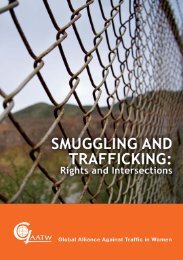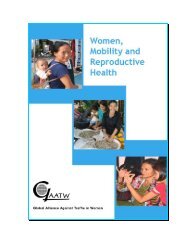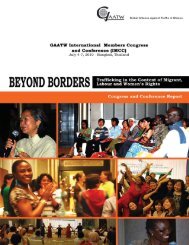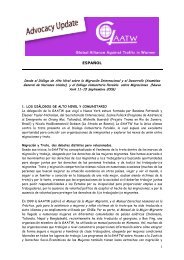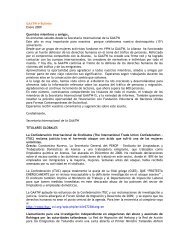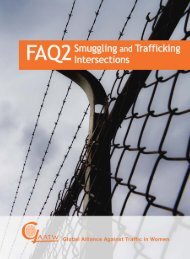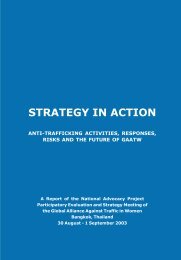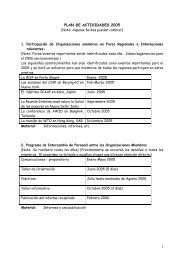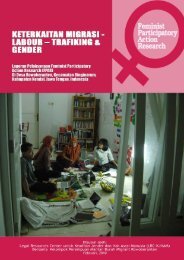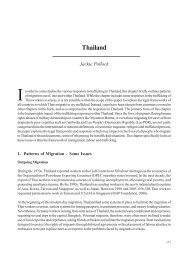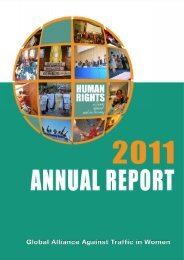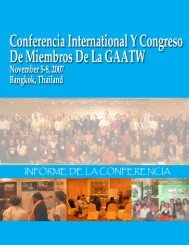Exploring Links between Trafficking and Migration - Global Alliance ...
Exploring Links between Trafficking and Migration - Global Alliance ...
Exploring Links between Trafficking and Migration - Global Alliance ...
- No tags were found...
You also want an ePaper? Increase the reach of your titles
YUMPU automatically turns print PDFs into web optimized ePapers that Google loves.
<strong>Exploring</strong> <strong>Links</strong> <strong>between</strong> <strong>Trafficking</strong> <strong>and</strong> <strong>Migration</strong>But because anti-trafficking has its own language <strong>and</strong> distinct concepts, it is easyfor anti-trafficking advocates to work only on anti-trafficking – through providingdirect assistance for trafficked persons, helping trafficked persons access justicethrough anti-trafficking laws, or running education campaigns specifically abouttrafficking. Sometimes this distinct or specialised work makes sense, especially forlegal procedures, since anti-trafficking law can be complicated <strong>and</strong> requires expertknowledge.Civil society organisations in many different fields tend to work separately. Differencesin their thinking <strong>and</strong> in what they emphasise can also create barriers. For instance,migrant rights advocates are sometimes upset by anti-trafficking organisations thatfocus on crime control over human rights. Crime control for migrants, who are notconsidered trafficked, results in migrants being seen as criminals, detained <strong>and</strong>deported.Another factor leading to this separation of work is the human rights legal framework.Working with rights may inherently involve creating special categories of exemption<strong>and</strong> with them specialists (like the anti-trafficking expert) <strong>and</strong> their “silos” (separatespaces in which civil society groups operate without much communication to eachother): 61 “The logic behind work rooted in silos arose from the conviction that thissegmentation represented something objectively real about migration. The worldof the refugee really was different from that of the migrant worker, <strong>and</strong> the legalmigrant from the undocumented, <strong>and</strong> all these from the trafficked person. In truththis sense of distinctiveness had much to do with international conventions <strong>and</strong> stateadministrative practices rather than absolute difference.” 62Further some migrant rights advocates see the mainstream focus on sex work <strong>and</strong>on women in anti-trafficking as not necessarily relevant to their work 63 – so there isno reason to work together. Or they might see anti-trafficking messages as contraryto people’s right to move. One academic commenter notes that “the moral panicover trafficking is diverting attention from the structural causes of the abuse ofmigrant workers. Concern becomes focused on the evil wrongdoers rather thanmore systemic factors. In particular it ignores the state’s approach to migration <strong>and</strong>employment...” 64 It may seem to migrant rights groups that anti-trafficking groupsdo not care about their issues – i.e. changing the migration system.In contrast, anti-trafficking advocates might see migrant rights groups as notgender sensitive. Sometimes women in migration are talked about only as domesticworkers <strong>and</strong> caregivers; or talked about only in relation to families left behind,which reinforces women’s roles as mother <strong>and</strong> wife. Men are rarely talked about asfathers <strong>and</strong> husb<strong>and</strong>s. None of these trends are true for all anti-trafficking or allmigrant rights NGOs, but they represent some of the concerns we have heard as wehave talked to many groups in preparation for this paper.In each local or country context there will be different things that civil societyorganisations disagree on. However, we list below things that we could all gain fromeach other. In many scenarios it makes sense to work together, to form jointcampaigns, <strong>and</strong> to lend each other expertise from our respective fields.What Anti-<strong>Trafficking</strong> Can Gain from a Migrant RightsPerspectiveA broader migrant rights framework makes several shifts that anti-traffickingadvocates can draw from. In looking at these we can see synergies orreasons why it might make sense to work together:23



